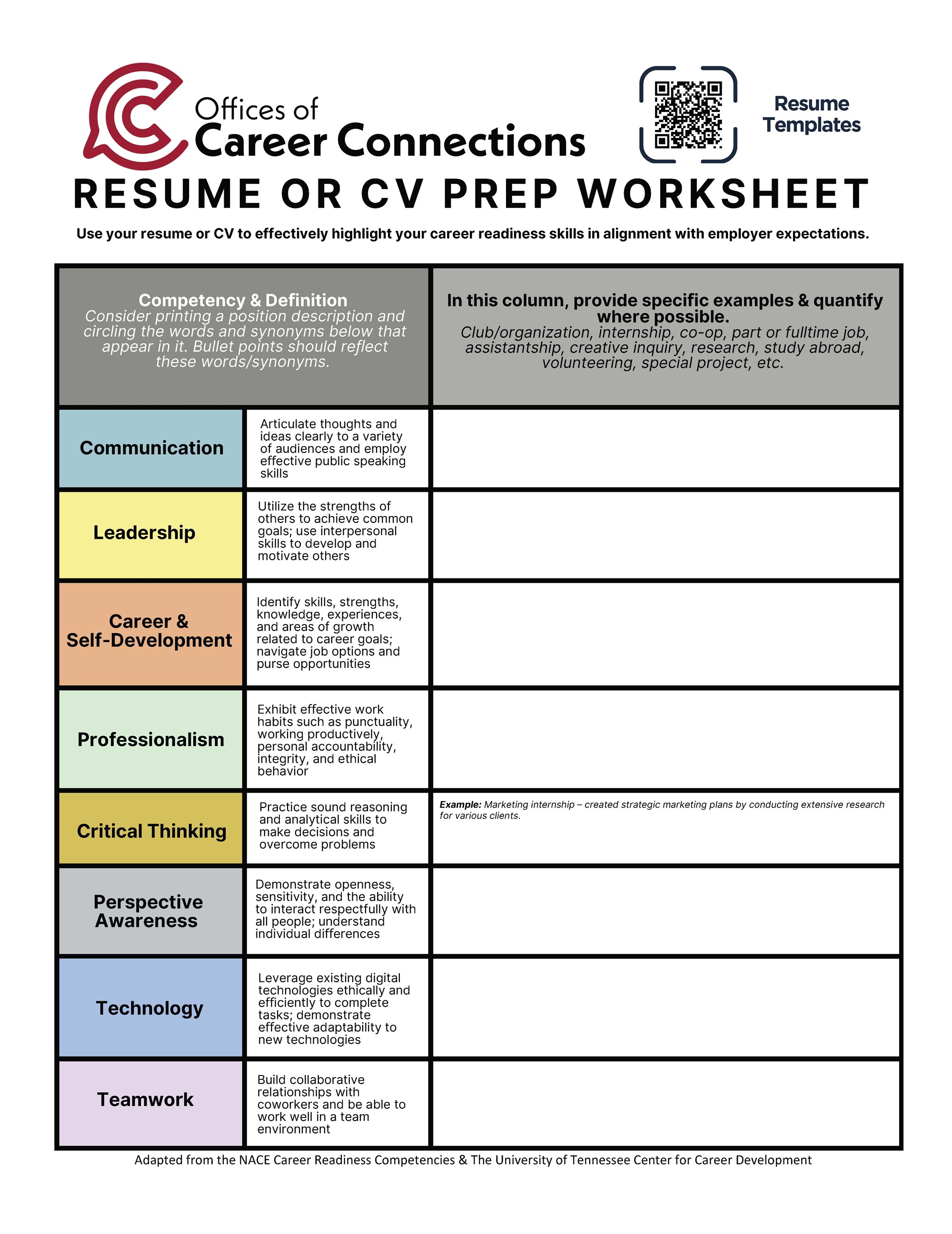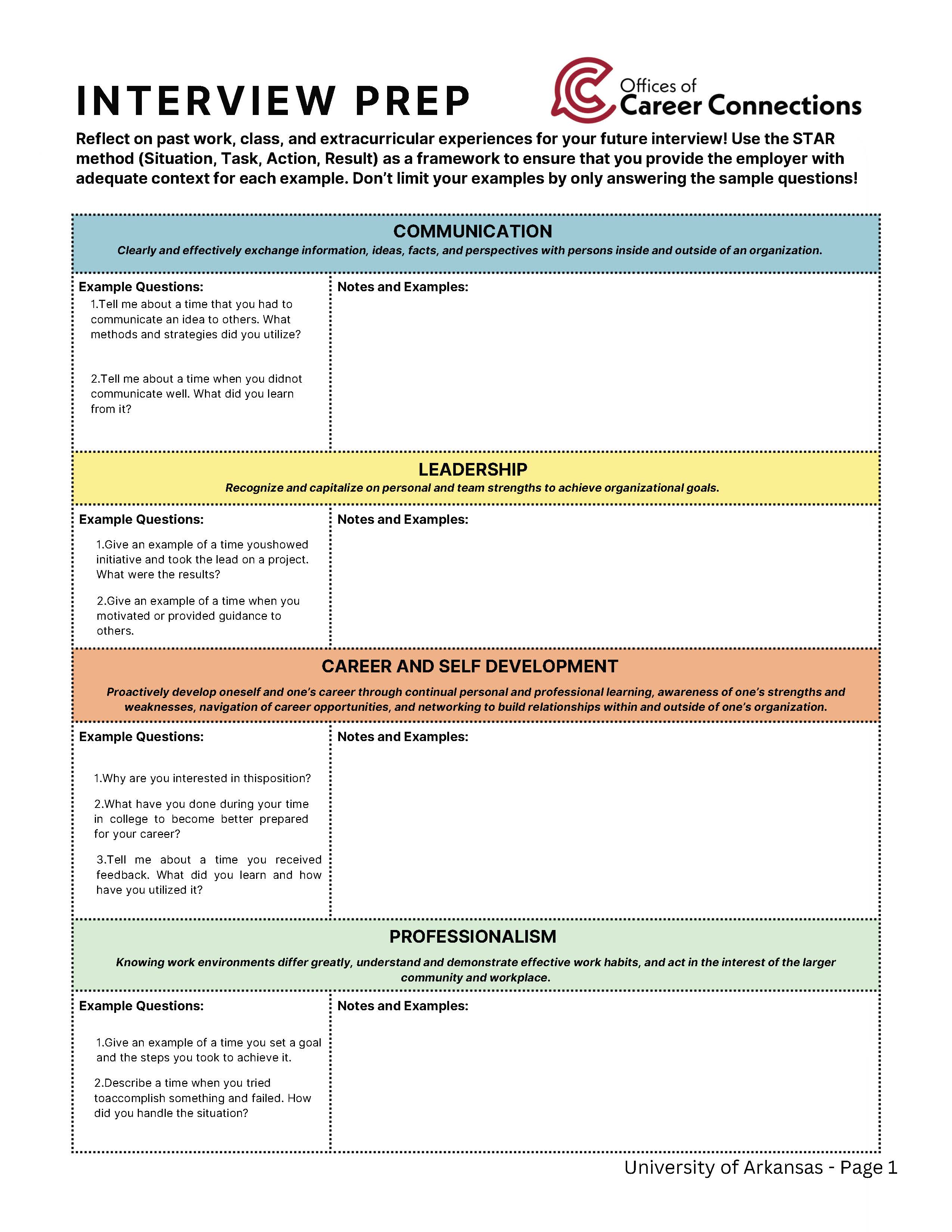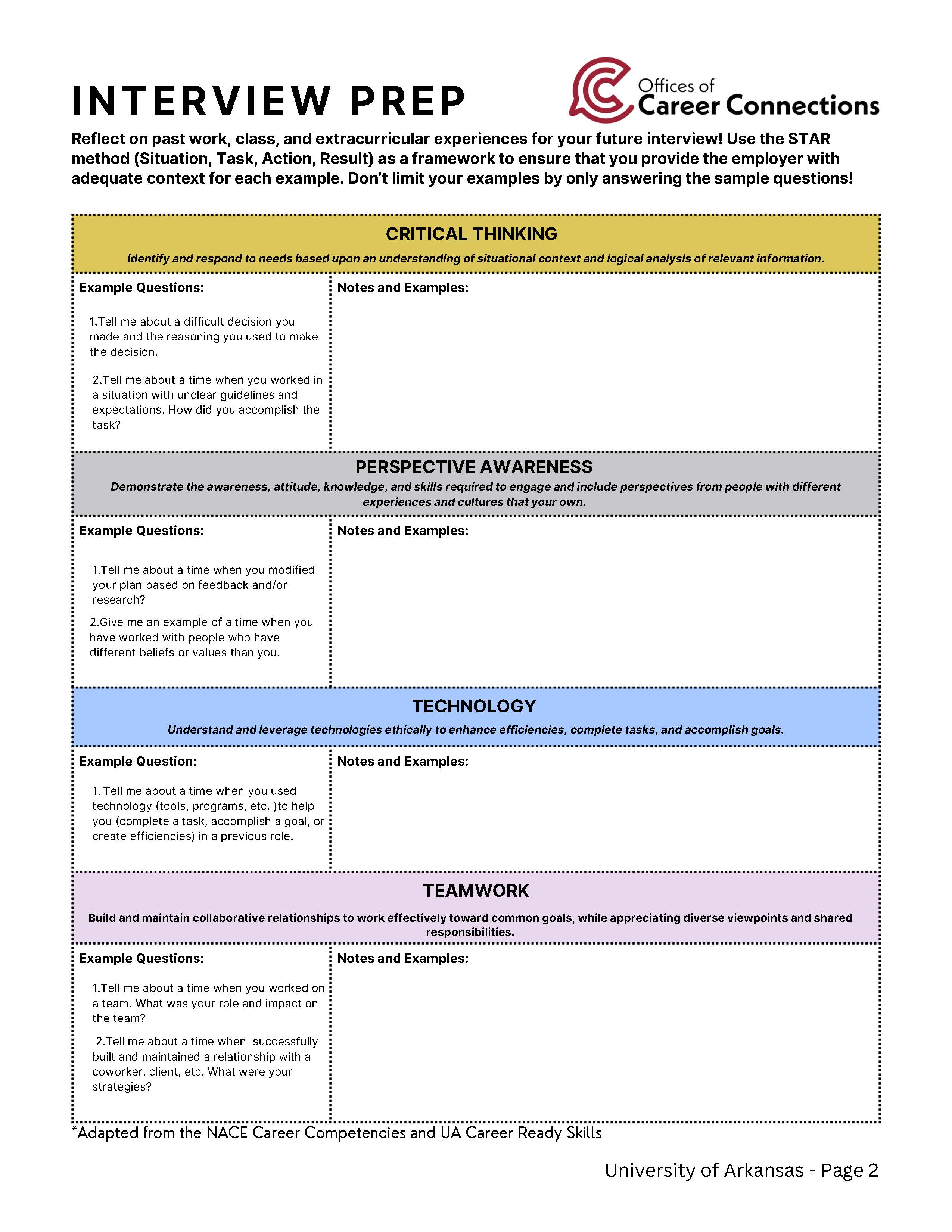Employers value your college education, but they also want to hear how you can help them solve problems and reach their goals.
UA Career-Ready Skills are your career currency. (*Adapted from research conducted by national research organizations.)
Building career-ready skills and identifying career opportunities is a lifelong process. Use the Career Exploration Roadmap to guide you along the process.
Learn how you can develop and demonstrate your career readiness by clicking the buttons below.
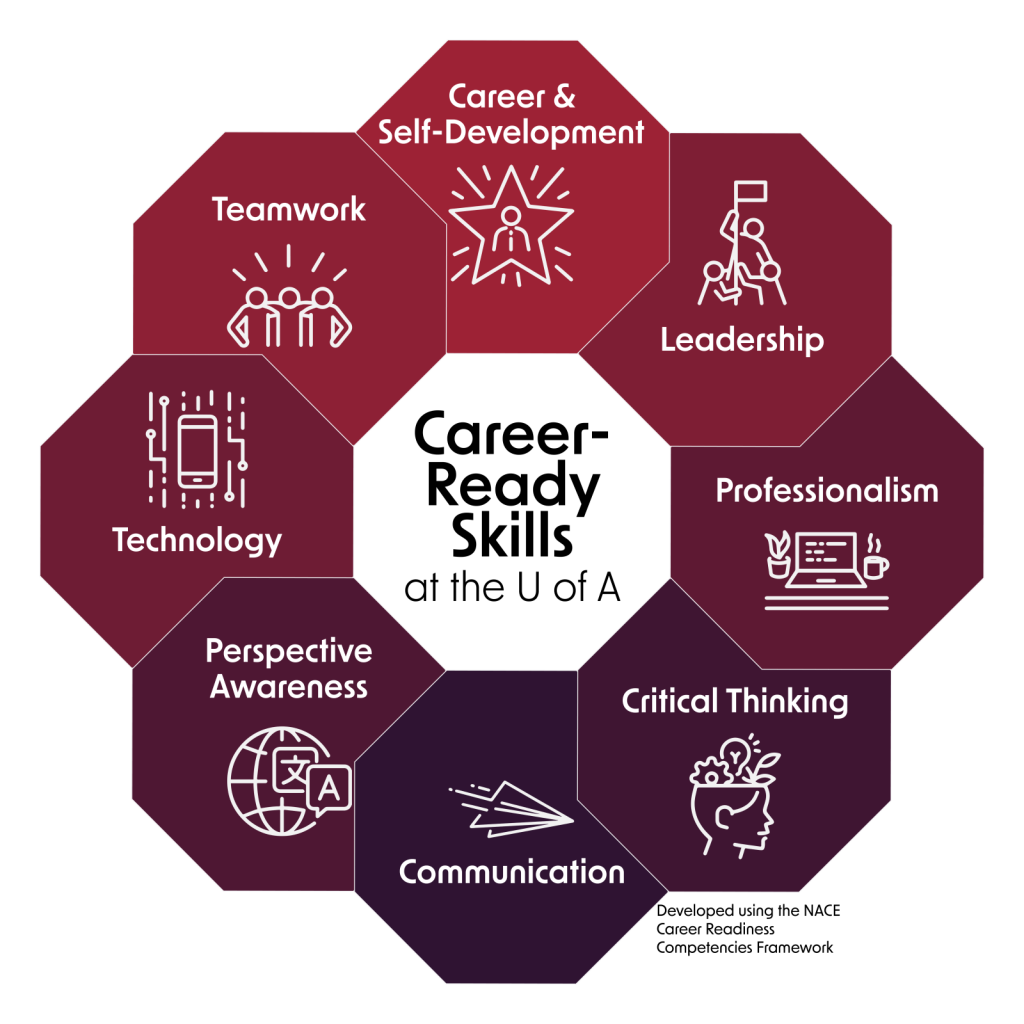

Proactively develop oneself and one’s career through continual personal and professional learning, awareness of one’s strengths and weaknesses, navigation of career opportunities, and networking to build relationships within and without one’s organization.

- Show an awareness of one’s own strengths and areas for development.
- Identify areas for continual growth while pursuing and applying feedback.
- Develop plans and goals for one’s future career.
- Professionally advocate for oneself and others.
- Display curiosity; seek out opportunities to learn from those with similar and different lived experiences.
- Assume duties or positions that will help one progress professionally.
- Establish, maintain, and/or leverage relationships with people who can help one professionally.
- Seek and embrace development opportunities.
- Voluntarily participate in further education, training, or other events to support one’s career.
- Complete career assessments to identify strengths and areas for development
- Seek out opportunities to learn: Conduct career conversations or informational interviews, request feedback from supervisors and peers
- Network with alumni and friends of the university using LinkedIn
- Learn more about Career and Self-Development on LinkedIn Learning. Below are links to a few videos to help you get started.
- Join Offices of Career Connections on HogSync and participate in campus activities posted on HogSync that are tagged with an OCC career-ready skill to complete the U of A Career-Ready badge

Clearly and effectively exchange information, ideas, facts, and perspectives with people inside and outside of an organization.

- Understand the importance of and demonstrate verbal, written, and non-verbal/body language, abilities.
- Employ active listening, persuasion, and influencing skills.
- Communicate in a clear and organized manner so that others can effectively understand.
- Frame communication with respect to different learning styles, individual communication abilities, and cultural differences.
- Ask appropriate questions for specific information from supervisors, specialists, and others.
- Promptly inform relevant others when needing guidance with assigned tasks.
- Striving to consider all viewpoints impartially and without bias.
- Create and deliver a presentation for a class, organization, or group.
- Take a Public Speaking class.
- Learn more about Communication on LinkedIn Learning. Below are links to a few videos to help you get started.
- Write stories, blogs, papers, advertisements, or press releases.
- Proofread all online and written communication to avoid errors.
- Listen, listen, listen. Put away your cell phone and give full attention to who is talking.
- Join Offices of Career Connections on HogSync and participate in campus activities posted on HogSync that are tagged with an OCC career-ready skill to complete the U of A Career-Ready badge

Identify and respond to needs based upon an understanding of situational context and logical analysis of relevant information.
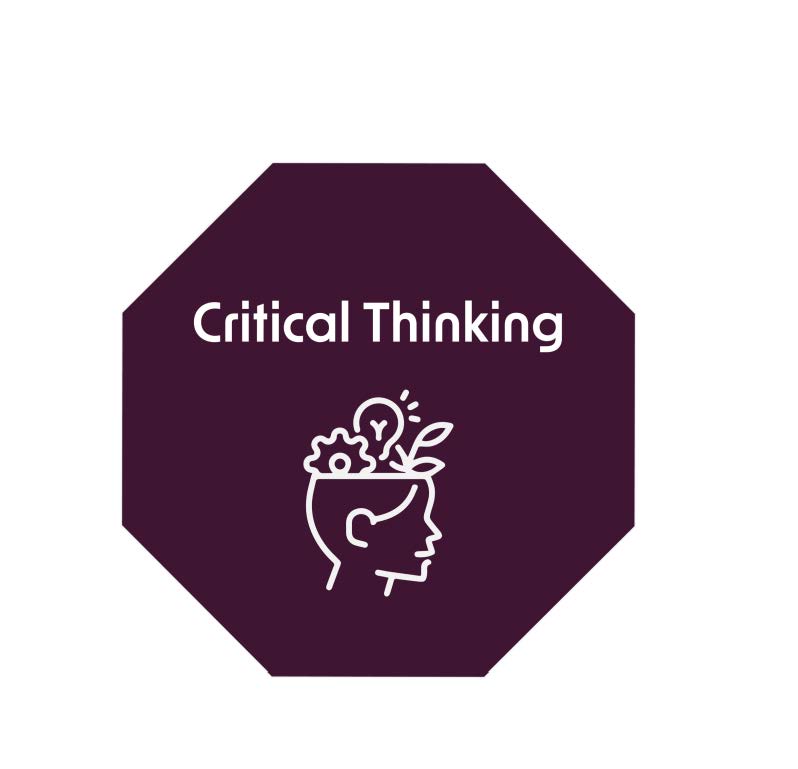
- Make decisions and solve problems using sound reasoning and judgment based on evidence.
- Gather and analyze information from an array of resources and individuals to fully understand a problem.
- Proactively anticipate needs and prioritize action steps.
- Summarize and interpret data accurately, while remaining humble and mindful of your limited perspective and the potential for errors that could influence outcomes.
- Effectively communicate actions and rationale, recognizing the unique perspectives and lived experiences of the intended audience.
- Multi-task well in a fast-paced environment.
- Activate your mind - read, play mind games or puzzles, journal, etc.
- Become a self-critic. Evaluate what you hear, what you read, and the decisions you make.
- Learn more about Critical Thinking on LinkedIn Learning. Below are links to a few videos to help you get started.
- Join a debate team.
- Get involved in undergraduate or graduate research or complete a project in class that requires you to solve a problem or analyze options.
- Join Offices of Career Connections on HogSync and participate in campus activities posted on HogSync that are tagged with an OCC career-ready skill to complete the U of A Career-Ready badge

Engage with people with different lived experiences & demonstrate flexibility, collaborative thinking and adaptability to create accessible practices in which everyone is included, valued and respected.

- Actively seek and integrate feedback from individuals who have varied lived experiences to inform decisions.
- Intentionally spend time examining your own perspectives and decision-making processes to deepen self-awareness and better understand one’s own decision making.
- Demonstrate curiosity and humility about different ideas and new ways of thinking, by being open to learning from others.
- Seek global cross-cultural interactions and experiences that enhance one’s understanding of people with different lived experiences and that lead to personal growth.
- Demonstrate flexibility by adapting to new and varied environments.
- Actively contribute to developing practices that thoughtfully support the needs of others.
- Work to actively develop an environment of belonging.
- Participate in a cultural student organization
- Participate in a Multicultural Center event
- Minor in cultural studies or a world language
- Study Abroad
- Use GoinGlobal to find job or internship opportunities in another country
- Become a Cross-Cultural Mentor
- Attend a cultural event or workshop that's outside of your own life experience
- Join Offices of Career Connections on HogSync and participate in campus activities posted on HogSync that are tagged with an OCC career-ready skill to complete the U of A Career-Ready badge

Recognize and capitalize on personal and team strengths to achieve organizational goals.

- Inspire, persuade, and motivate self and others under a shared vision.
- Seek out and leverage a wide scope of resources and feedback from others, to inform direction.
- Use innovative thinking to go beyond traditional methods.
- Willingness to consider new ideas and perspectives, even when they challenge one's own beliefs.
- Serve as a role model to others by approaching tasks with confidence and a positive attitude.
- Motivate and inspire others through encouragement and mutual trust.
- Plan, initiate, manage, complete and evaluate projects.
- Join a UA leadership development program such as Leadership Academy, or Lead Hogs.
- Take on a leadership role in an on-campus organization such as ASG.
- Learn more about Leadership on LinkedIn Learning. Below are links to a few videos to help you get started.
- Become an S.I. Leader, Conversation Club Leader, or Resident Assistant.
- Take the lead on a class project.
- Serve in leadership role in an internship, volunteer project, job, research project, or Greek Life committee.
- Join Offices of Career Connections on HogSync and participate in campus activities posted on HogSync that are tagged with an OCC career-ready skill to complete the U of A Career-Ready badge

Knowing work environments differ greatly, understanding and demonstrating effective work habits, and acting in the interest of the larger community and workplace.
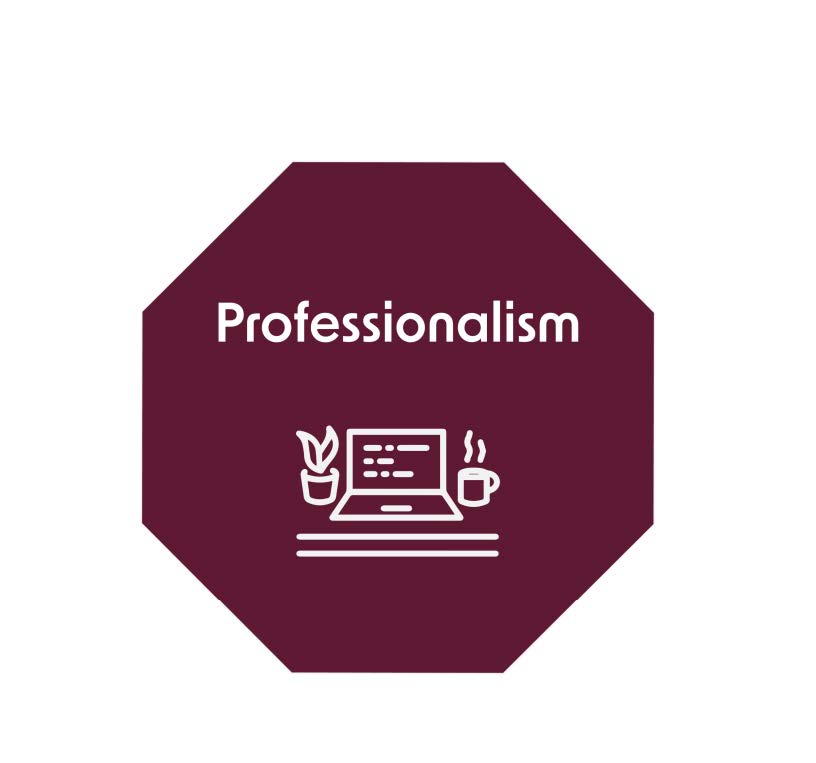
- Act fairly with integrity and accountability to self, others, and the organization.
- Maintain a positive personal brand in alignment with organization and personal career values.
- Be present and engaged.
- Demonstrate preparedness and dependability (e.g., report consistently for work or meetings).
- Prioritize and complete tasks to accomplish organizational goals.
- Consistently meet or exceed goals and expectations.
- Pay attention to detail, resulting in few if any errors in their work.
- Avoid arrogance or overconfidence in one’s own abilities.
- Show a high level of dedication toward doing a good job.
- Be on time to every class, meeting, job, and commitment. Punctuality is key.
- Invest in professional workplace attire. Rent professional attire for free from Boss Hog Outfitters.
- Learn more about Professionalism on LinkedIn Learning. Below are links to a few videos to help you get started.
- Complete an internship to learn workplace culture and ethics in your industry.
- Take a UA course on ethics or professionalism.
- Take initiative on projects or tasks without being told.
- Join Offices of Career Connections on HogSync and participate in campus activities posted on HogSync that are tagged with an OCC career-ready skill to complete the U of A Career-Ready badge

Build and maintain collaborative relationships to work effectively toward common goals, while appreciating multiple viewpoints and shared responsibilities.

- Engage in active listening by attentively considering others' perspectives, reasoning, and emotions, asking relevant questions, and allowing them to speak without interruption.
- Effectively manage conflict, interact with and respect individual personalities and life experiences; meet ambiguity with resilience.
- Be accountable for individual and team responsibilities and deliverables.
- Employ personal strengths, knowledge, and talents to complement those of others.
- Exercise the ability to compromise and be agile.
- Recognizing the limits of one’s own knowledge and building teams that include multiple perspectives.
- Collaborate with others to achieve common goals.
- Build strong, positive working relationships with supervisor and team members/coworkers.
- Work with others on a class project, while in an internship, or during a volunteer effort where responsibility is shared.
- Join a student organization or team on campus where you can help achieve a common goal.
- Learn more about Teamwork on LinkedIn Learning. Below are links to a few videos to help you get started.
- Join a musical group or act in a play.
- Handle difficult conversations with respect.
- Ask offices on campus to collaborate with you to host an event.
- Join Offices of Career Connections on HogSync and participate in campus activities posted on HogSync that are tagged with an OCC career-ready skill to complete the U of A Career-Ready badge

Understand and leverage technologies ethically to enhance efficiency, complete tasks, and accomplish goals.

- Navigate change and be open to learning new technologies.
- Use technology to improve efficiency and productivity of their work.
- Identify appropriate technology for completing specific tasks.
- Manage technology to integrate information to support relevant, effective, and timely decision-making.
- Quickly adapt to new or unfamiliar technologies.
- Manipulate information, construct ideas, and use technology to achieve strategic goals.
- Take a UA technology course through Global Campus.
- Learn more about Technology on LinkedIn Learning. Below are links to a few videos to help you get started.
- Learn technology or software through a class or research project.
- Complete training in industry programs or software through an internship or volunteer opportunity.
- Join Offices of Career Connections on HogSync and participate in campus activities posted on HogSync that are tagged with an OCC career-ready skill to complete the U of A Career-Ready badge
Increase your career confidence by learning what the top 8 career-ready skills are, how well you've developed them to-date and ways you can further develop these employer-valued skills at the U of A by completing the NACE Career Readiness+ Inventory. (~10 minutes to complete)
Doctoral Students: Use the Graduate Student Career Readiness Assessment for a more targeted assessment of your career readiness.
Building a new skill can make you competitive as you enter the job market. Or you may learn a new skill simply because you are interested! Whatever motivates you, the benefits of learning a new skill can go beyond just adding it to your resume. Developing a new skill can help you adapt to change and make better connections between your current skill set!
Free Resources to help you learn a new skill:
LinkedIn Learning is an online educational platform with over 5,000 courses that help you discover and develop business, technology-related, and creative skills through expert-led course videos. Once you complete a course, you can even add it as a skill and/or certification on your LinkedIn profile.
Follow these steps to access LinkedIn Learning for free:
- Visit https://myapps.microsoft.com/
- In the search bar, type: LinkedIn Learning
- Click the LinkedIn Learning icon
With Udemy you can study any topic from thousands of expert-led courses at any time. To view free courses, select your category of interest, scroll down and filter by "price" and select "free"
Codecademy helps you learn computer skills and coding, ranging from website development to data analysis.
EdX allows you to access over 2,000 online courses from 140 top institutions like Berkley and Harvard.
FutureLearn's short online courses are scheduled over a period of weeks and includes information on the number of hours you’ll need to invest each week. You can choose from thousands of online courses from top universities and specialist organizations.
YouTube EDU has a selection of high-quality educational videos, from channels such as YaleCourses, Stanford Business School, and Gresham College and Kahn Academy.
HubSpot Academy offers online training in inbound marketing, sales, and customer service. They specialize in comprehensive certifications, singular topic courses, and bite-sized lessons for individuals looking to grow their career and business. You must create a free account to browse courses.
University of Arkansas students have free, unlimited access to LinkedIn Learning, an online library of high-quality instructional videos on the latest software tools and skills. Log in with an organization account using your @uark.edu information. View hundreds of short videos for tips and advice straight from professionals in the field.
Classroom to Career UNIV 14031
This course will equip students with the tools to prepare for a career or graduate
school upon college graduation. Instruction in this eight-week class will focus on
the following topics: Self-Awareness, Career Exploration, Work and Leadership Experience,
Job/Graduate Search Strategies, Resume/Cover Letter Writing, Interview Skills, and
Professional Networking.
Career Connections (ARSC 30103)
This course teaches students how to capitalize on their strengths, skills, experience,
professional connections, and academic discipline. Key components of this course are
guest lectures from on-campus and off-campus professionals, interactive group activities
to practice professional skills, and the creation of an online portfolio. Prerequisite:
Sophomore standing. (Typically offered: Fall and Spring)
Going Pro: Professional Project Experience (ARSC 10401 Special Topics - select Going
Pro section)
Get hands-on, professional experience completing a project at the site of your choice:
nonprofit or for profit, on or off campus, or even at your current part-time job!
(Typically offered: Fall and Spring)
Internship Readiness (ARSC 10401 Special Topics - select Internship Readiness section)
In this course you will learn how to create relationships with professionals to build
strategic social capital and access the hidden internship market. You will also develop
your personal internship search toolkit. (Typically offered: Fall and Spring second
8-weeks)
Professional ePortfolio ARSC 32003
This course equips student with tools to develop a professional portfolio. This career
website will showcase their skills, talents, and experiences. By writing about the
connections between what they are doing in college and their professional goals, students
can capitalize on their experiences and grow as individuals.
Practice and develop UA Career-Ready Skills by engaging in campus activities or submitting skill-development reflections found on HogSync, the campus student engagement platform powered by CampusGroups.
The campus-wide Career-Ready Badge provides an inventory of students' career readiness and a virtual map of opportunities offered by departments and student organizations to practice and develop 8 UA Career-Ready Skills (adopted from research conducted by national research organizations.)
How Do I Complete the Badges?
Every time you check into a HogSync event tagged with an "OCC" Career-Ready Skill, you're one step closer to completing the Career-Ready Badge.
To Complete:
- Check into at least 5 HogSync events tagged "OCC + career skill" for each of the 8 UA Career-Ready Skills (40 total)
- Submit a final reflection of your overall skill practicing and developing experiences that demonstrates your ability to articulate how you have used the eight Career-Ready Skills.
Alternative to event check-ins->
- Complete class assignments or participate in community events focused on practicing and developing a specific career-ready skill or complete a skill-focused learning project on your own.
- Submit a career-ready skill reflection form found on HogSync > My Activity > My Surveys/Forms and search by "career."
- Your reflection will be reviewed and approved if you've answered all questions adequately. (Example answers are provided on the form.)
What Do I Earn?
- LinkedIn badge signaling to employers you are Career Ready
- Completers who also complete the First Destination Survey before graduation will receive a gold graduation cord.
Project Impact:
- Increased student engagement in co-curricular activities
- Shared language campus-wide regarding career readiness skills
- Increased understanding of co-curricular activities relationship to students' individualized post-graduation goals.
How can I help students participate in the UA Career-Ready Badge?
Faculty & Instructors: View the Help Students Participate in the UA Career-Ready Badge Flyer
When you include career-ready projects and assignments in your classes, you're giving students an opportunity to participate in the UA Career-Ready Badge.
- Familiarize yourself with the career-ready skills and behaviors
- Identify one career-ready skill that most relates to your project or assignment.
- Clearly label the project or assignment (i.e. on your syllabus, project or assignment instructions, etc.) as an opportunity to practice and develop the career-ready skill.
- Encourage your students to submit career-ready skill reflections of their experiences. (Reflection forms made available on HogSync.)
Event Coordinators & RSO Advisors/Officers:
Your role is crucial in this process. When planning events, please tag them with the single UA Career-Ready Skill that is most practiced and developed during the activity.
- Familiarize yourself with the career-ready skills and behaviors.
- Assign 1 tag for each event. By tagging events in HogSync, together we are creating
a virtual map of student opportunities to practice and develop key, employer-identified
career-ready skills.
Note: Designate only 1 tag for HogSync event tags. HogSync tagging instructions video


